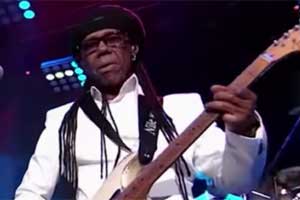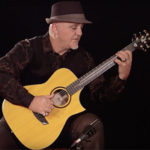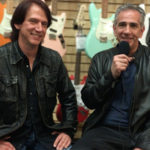Chic veteran and hit-making producer is ready for his Rock Hall moment
By Gary Graff
April 7, 2017
If Nile Rodgers had only played the guitar licks for Chic’s “Le Freak” and Daft Punk’s “Get Lucky,” he’d be more than deserving of the Award For Musical Achievement that he’s receiving from the Rock and Roll Hall of Fame on Friday (April 7) in Brooklyn. The truth, of course, is he’s done much more than that. Chic and its universe, including Sister Sledge, is certainly the New York native’s calling card, but it’s only paved the way for other glories collaborating over the years with a wide range of other artists including Diana Ross, David Bowie, Duran Duran, Bryan Ferry, Madonna, INXS, Britney Spears, Avicii, Disclosure, Sam Smith, Lady Gaga, Pitbull, Keith Urban and many more.
A product of ‘50s beatnik culture at home, Rodgers learned about breaking down musical barriers early, and was inspired by the Beatles to take up guitar. He played in the house band at the Apollo Theater and also with the Sesame Street ensemble before meeting the late bassist Bernard Edwards in 1970; the two formed the Big Apple Band and then Chic, which despite being mislabeled as a disco band produced some of the finest pop-funk dance hybrid music ever, as evidenced by the enduring success of “Le Freak,” “Good Times,” “I Want Your Love” and Sister Sledge’s “We Are Family.” All speak to Rodgers’ taste and cleverness as a composer and arranger, but most also demonstrate his belief in the power of a great guitar hook to drive a song to success. There’s a sense of “finally!” for Rodgers’ Rock Hall award, as Chic has been nominated 11 times without success. But Rodgers, who’s working on a new Chic album, still wants his band to get its time to shine, too.
FGPO: The Rock and Roll Hall of Fame awaits. How are you feeling about it?
Rodgers: It’s still weird and [I’m] ambivalent about that, because if it weren’t for Chic…they say that it’s for musical achievement or whatever, but it’s like, OK, has the other stuff that I’ve done achieved more than Chic? We only were successful for two years, and in two years look at [the] amount of records we sold and made. We have three albums, and if you put up the collective sales and influences of those three albums, it’s pretty damn incredible. “Le Freak” alone; that song went to No. 1 on the Billboard charts three times. The same song! I’m blown over, because I didn’t expect to be singled out of Chic, so that’s weird right away. It’s just weird for me to be picked out of Chic and say: “Nile, you belong in the Rock and Roll Hall of Fame, but those other guys…” Of course, I am flattered and honored like crazy, but it’s sort of bittersweet for me, because of all the things I’ve done that I’m exceptionally proud of, I’m really proud of Chic.
FGPO: Do you think Chic’s association with disco is a wall for something called the Rock and Roll Hall of Fame?
Rodgers: You try and avoid the obvious, but race and perception definitely plays a role in this, because I’ve been in more traditional rock bands than you can imagine. Before Chic became a dance band, we were a pretty hard rocking band. I grew up believing — and I actually still believe this in my heart — that rock ‘n’ roll was a state of mind. We started out as your basic rock ‘n’ roll blues band. That’s where we started. We were doing gigs that were just those kinds of gigs, were playing all the same kind of songs everybody else played, and it was only after we couldn’t get a deal with our original rock songs that we finally wrote our very first dance record, and that very first song we wrote as a dance record we got a deal with.
FGPO: At the risk of playing into that racial stereotype, how’d you become a rock guy?
Rodgers: When I was around 15 years old, I met this guy named Dr. Timothy Leary and all these people who would eventually be called hippies. They were called freaks at the time, and when I met them they asked me if I wanted to take a trip. I said: “Absolutely!” [laughs] I had no idea they were talking about LSD. I don’t know how I ingested it. I didn’t even know what it was, but somehow it got into my bloodstream. And the Doors’ first album had just come out, so for the next two days we discovered the Doors. So two days later, I show up at my grandmother’s house, my clothes all funky and tattered, and she’s, like, crying, wondering what happened to me. The police were there. The first words out of my mouth were: [sings] “This is the end…” I had gone from this guy into totally classical music and had become a complete hippie freak in just 46 hours and my grandmother didn’t recognize me.
FGPO: Your doors of perception were open, eh?
Rodgers: Boy, was I open. I was open. I had never touched a guitar in my life. I was a clarinet major. I was pretty good. I could read music and everything. So that gave me a great advantage; the written range of a B-flat clarinet is the same as the written range on the guitar, so, boom, when I started playing guitar I was a really good music reader right from the jump, and that helped me in my career, ’cause guitar players are notoriously bad music readers even though they’re amazing players.
FGPO: Were there particular influences or sources for you as you learned to play guitar?
Rodgers: My jazz guitar teacher asked me one day why I was studying with him. I said: “’Cause I want to play concerts, I want to make records, I want to do all sorts of stuff — big orchestral works, films, all these sorts of things.” He said: “Really? Is that all? You could easily do all of that.” I’m like: “Wow, how can I do it?” He said: “Play better.” So I started just practicing, practicing, practicing, learning to play better. And I was gigging, doing lots of record dates. My first real job was Sesame Street.
FGPO: What was that like?
Rodgers: I auditioned; they wanted a kid who could read the music — “People In Your Neighborhood,” “Rubber Ducky,” that sort of thing. So I went in, read the charts clean as a whistle and got the gig. That set me off on this journey of discovery. The great thing about music is that it’s…just like the universe. We’re just like planetoids, asteroids, spinning around and bumping into stuff. And, as we bump into stuff, our trajectory changes and that’s what happens to me. I was out there bouncing into people, playing with different musicians.
FGPO: You were on kind of a sophisticated trajectory. Did you transition easily into making pop music?
Rodgers: Y’know, there was one day I was really grumpy. [His jazz teacher] said: “What’s wrong, youngblood?” and I said: “I got to do this boogaloo gig tonight, and we’re playing all these bullshit songs, all the Top 40.” He looked and me and goes: “Whoa, Nile, what makes you believe these are bullshit songs?…What makes you believe you’re the ultimate consumer? Any song that sells and gets to the Top 40, gets into the Top 10, gets into the Top 20, any song is a great composition.” I said: “‘Sugar, Sugar’ is a great composition?” He said: “Absolutely — especially ‘Sugar, Sugar’ because it speaks to the souls of a million strangers.” He really berated me; he was trying to teach me how to not be a snob. I was like: “Wow,” and two weeks later I wrote a song called “Everybody Dance,” because that was so profound on me. I wanted to learn to speak to the souls of a million strangers. That woke me up to the power of what we call pop music.
FGPO: Meeting Bernard Edwards was pivotal, right?
Rodgers: Bernard Edwards was amazing. He was really only into R&B, but he was such an incredible musician. He had such a finely tuned ear, I decided I wanted to go on the journey with him. So I went from Sesame Street to the Apollo Theatre house band, and then Bernard got the job as bandleader of [the Big Apple Band]. We had one record, and we gigged off that one record for, like, two years and at one point became the opening act for the Jackson 5. And that solidified my lifelong relationships with Michael Jackson.
FGPO: That’s kind of a quiet part of your history. Where did that fit in?
Rodgers: We became friends forever. Me being super hippie and super anti-establishment. Michael’s dad was, like, a taskmaster. And I’m like: “Man, don’t hassle my head, man.” Like: “Hey, Joe, man…” And he’s the boss, and I’m talking to him like: “Hey man, Joe, please brother.” So they used to call me Brother Orgag. They’re all dressed, looking like pimps and stuff, and I’m in my patchwork jeans and platform shoes. And Michael and I had this amazing connection.
FGPO: There’s a kind of Zelig or Forrest Gump quality to your life and career.
Rodgers: I kept bumping into all these wonderful people, and my life just kept expanding. I found that I wasn’t intimidated by stars; I was comfortable with them, and I had some kind of innate talent for being able to communicate with them.
FGPO: So what kind of insight has that given you about why some succeed and some don’t?
Rodgers: The people who are stars and make it, who have hit records and have repeated hit records, yeah, they have it going on. You can feel the vibe. When I first met Madonna, phew, it was clear as a bell to me. I’ve met Gaga; whew, clear, clear, clear. Daft Punk, I remember the first night I met them was 20 years ago at a listening party, and I knew they had something interesting — well, it sounded a lot like Chic, by the way. [laughs] When I first saw Bruno Mars, I knew he was the bomb. I knew it instantly. Some people just have that magical thing, and you can feel the vibe right away. Others, you can actually work on it and develop that magical thing, but some people, they just have that stardust sprinkled on them and you can feel it.
FGPO: Is there a particular way you approach working with others?
Rodgers: When I’m in a recording studio, when I’m in a working situation, when I’m conducting — whether it be a symphony orchestra or just two or three people — there’s a certain love that I have for that musician, for that situation, ’cause I think that music is the voice that I speak with. And, when I’m working for you, I’m trying to help amplify your own voice. I’m trying to help you become better than you were, ’cause that’s what my teachers tried to all do for me.
FGPO: You released a new Chic single: “I’ll Be There,” in 2015. When are we going to hear the rest of the album, It’s About Time?
Rodgers: Y’know, I had this great, fun, celebratory record and, instead of seeing this positive wonderful world, there was this negative world of dark, dark, dark stuff — David [Bowie] died and Prince died and so many other people, and then the election. So I just felt that it wasn’t time. It may not be the time now, either, but it hit me that 2017 was the 40th anniversary of Studio 54 and the 40th anniversary of Chic. We started together, so I’m thinking that’s a good omen for putting this thing out soon.






